This post lists all the services AWS provides and supports today. In upcoming posts, we will explore more about these services.

Posted by Sriram Sanka on January 12, 2025
This post lists all the services AWS provides and supports today. In upcoming posts, we will explore more about these services.

Posted in AWS | Tagged: apple, AWS, Cloud, google, marketing, microsoft, Services, technology | Leave a Comment »
Posted by Sriram Sanka on January 8, 2025

Oracle has announced OracleCloudWorld(OCW25) Tour Mumbai 2025, which is scheduled On Feb 6, 2025, https://www.oracle.com/in/cloudworld-tour/ & you can check all the session details at https://reg.rf.oracle.com/flow/oracle/mumbai25/catalog/page/catalog.
BTW, Did you get a chance to download the PPT/PDF from the previous year? if not, you can refer to the following to download as needed.
Thanks to Connor for sharing the URL https://raw.githubusercontent.com/connormcd/misc-scripts/refs/heads/master/ocw_file_list in his blog post a few months ago.
source : https://connor-mcdonald.com/2024/09/20/the-cloudworld-2024-mega-download/
Here is the Python Code to go through all the lists and Download.
import os
import requests
# Define the URL containing the list of files
file_list_url = "https://raw.githubusercontent.com/connormcd/misc-scripts/refs/heads/master/ocw_file_list"
# Define the output directory for downloaded files
output_dir = "downloaded_pdfs"
os.makedirs(output_dir, exist_ok=True)
def download_file(file_name, file_url):
try:
response = requests.get(file_url, stream=True)
response.raise_for_status()
file_path = os.path.join(output_dir, file_name)
with open(file_path, "wb") as file:
for chunk in response.iter_content(chunk_size=8192):
file.write(chunk)
print(f"Downloaded: {file_name}")
except requests.exceptions.RequestException as e:
print(f"Failed to download {file_name} from {file_url}: {e}")
def main():
try:
# Fetch the file list
response = requests.get(file_list_url)
response.raise_for_status()
file_list = response.text.splitlines()
# Process each line in the file list
for line in file_list:
if line.strip():
# Split the line into file name and URL
parts = line.split(maxsplit=1)
if len(parts) == 2:
file_name, file_url = parts
download_file(file_name, file_url)
else:
print(f"Invalid line format: {line}")
except requests.exceptions.RequestException as e:
print(f"Failed to fetch file list: {e}")
if __name__ == "__main__":
main()
This creates a Directory called “downloaded_pdfs” and get all the resources listed on the above URL.
Just Save this file as ocw24.py and execute using python “python ocw24.py”


Having Session PPT/PDF helps individuals to focus more on the latest tech trends and learn. Hope this post helps you to learn new.
-Sriram Sanka
Posted in Oracle Cloud World, Python | Tagged: ai, database, OCW, OCW24, OCW25, oracle, programming, Python | Leave a Comment »
Posted by Sriram Sanka on October 14, 2023
Posted in Uncategorized | Leave a Comment »
Posted by Sriram Sanka on September 20, 2023
Posted in Uncategorized | Leave a Comment »
Posted by Sriram Sanka on September 20, 2023
Oracle has Two Load Balancer Services available. , In case if you are not sure which one is best for you and what are the differences, you can refer the following chart provided by Oracle. https://cloud.oracle.com/load-balancers#
The load balancer service provides a reverse proxy solution that hides the IP of the client from backend application server and vice versa. It is capable of performing advanced layer 7 (HTTP/HTTPS), layer 4 (TCP) load balancing and SSL offloading.
Best for: Websites, mobile apps, SSL termination, and advanced HTTP handling.
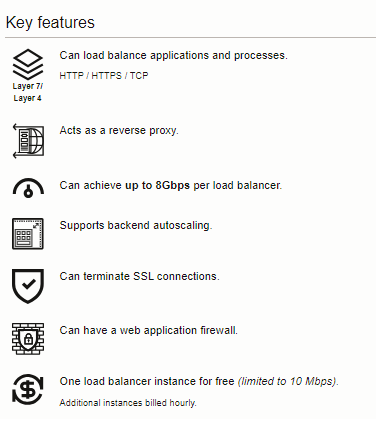
The network load balancer service provides a pass-through (non-proxy solution) that is capable of preserving the client header (source and destination IP). It is built for speed, optimized for long running connections, high throughput and low latency.
Best for: Scaling network virtual appliances such as firewalls, real-time streaming, long running connections, Voice over IP (VoIP), Internet of Things (IoT), and trading platforms.
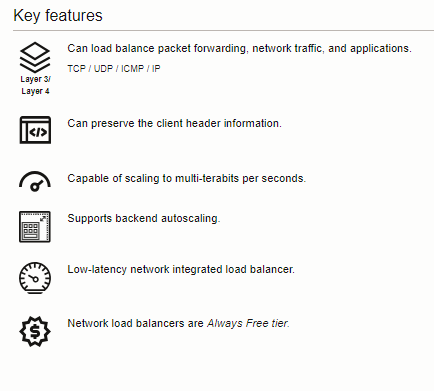
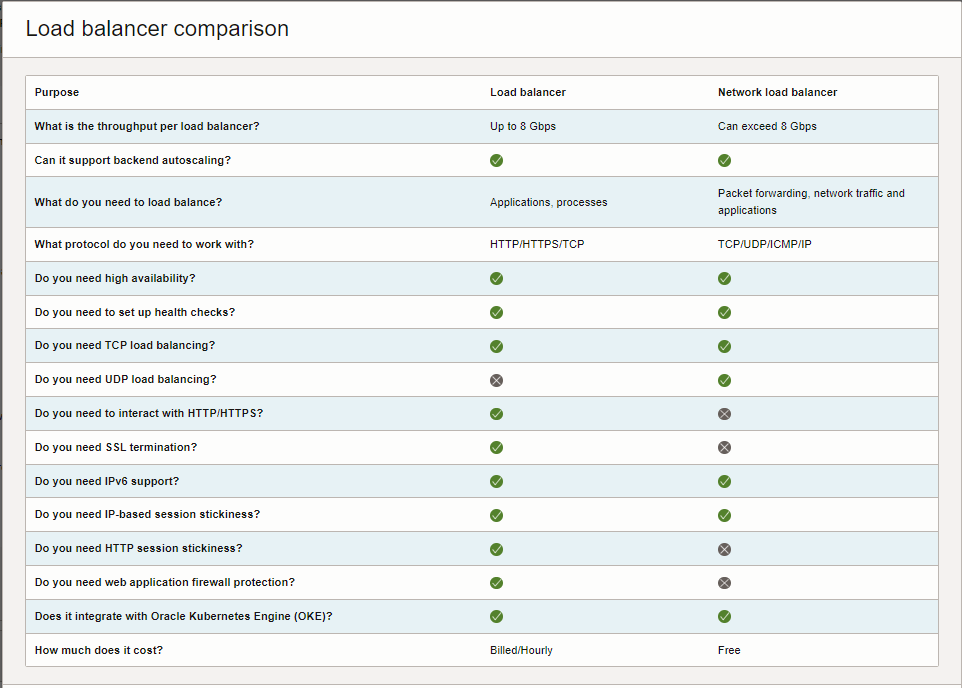
Posted in Cloud, Load Balancer, Network Load Balancer, OCI, oracle, Oracle Cloud Service, Web-Traffic | Tagged: Load Balancer, OCI, Oracle Cloud | Leave a Comment »
Posted by Sriram Sanka on September 12, 2023
When signing up, it is mandatory to configure and enable Multi-Factor Authentication (MFA). Once configured, during the login process, you will be required to obtain approval either through the Oracle Authenticator App or by obtaining a passcode.
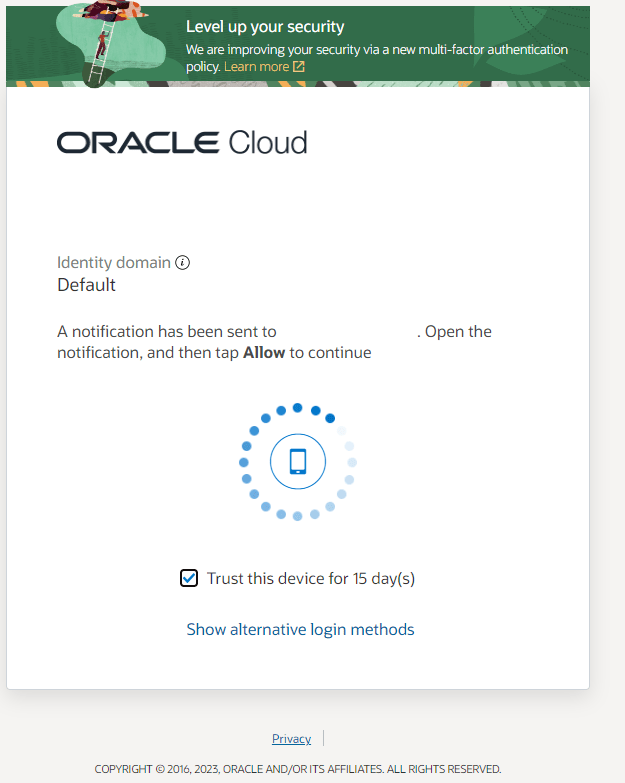
To customise the MFA Configuration, access the Identity & Security section and select the desired domain. This action will direct you to the Domain Dashboard, where you can choose the appropriate security settings and explore additional options for Multi-Factor Authentication.
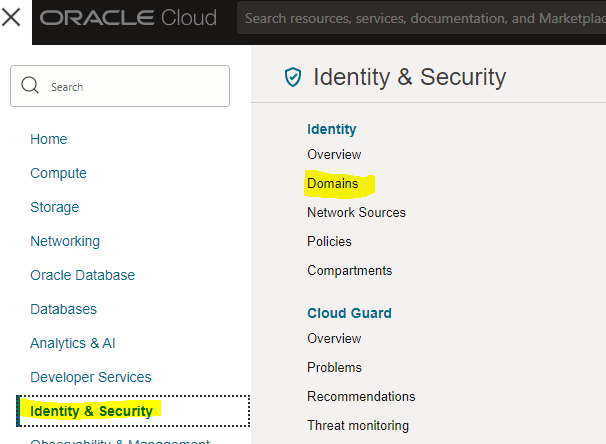
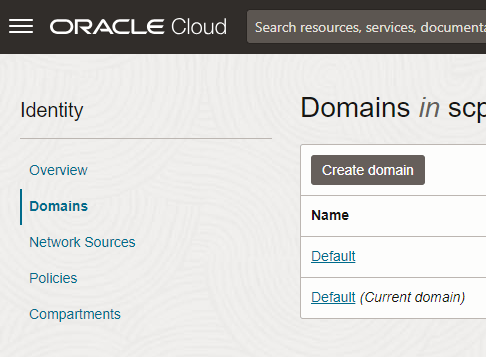
You can change the Default Configuration under Identity–>Domains–>Default domain–>Security –>MFA, when you try to update the changes , you may get the error as below “You cannot disable these factors as they are being referenced in Rules used in Sign-On Policies. Remove them from the Rules before disabling the factors.”



In order to prevent the occurrence of the aforementioned error, it is advisable to disable the default sign-in policy for both users and administrators as indicated in the error message.
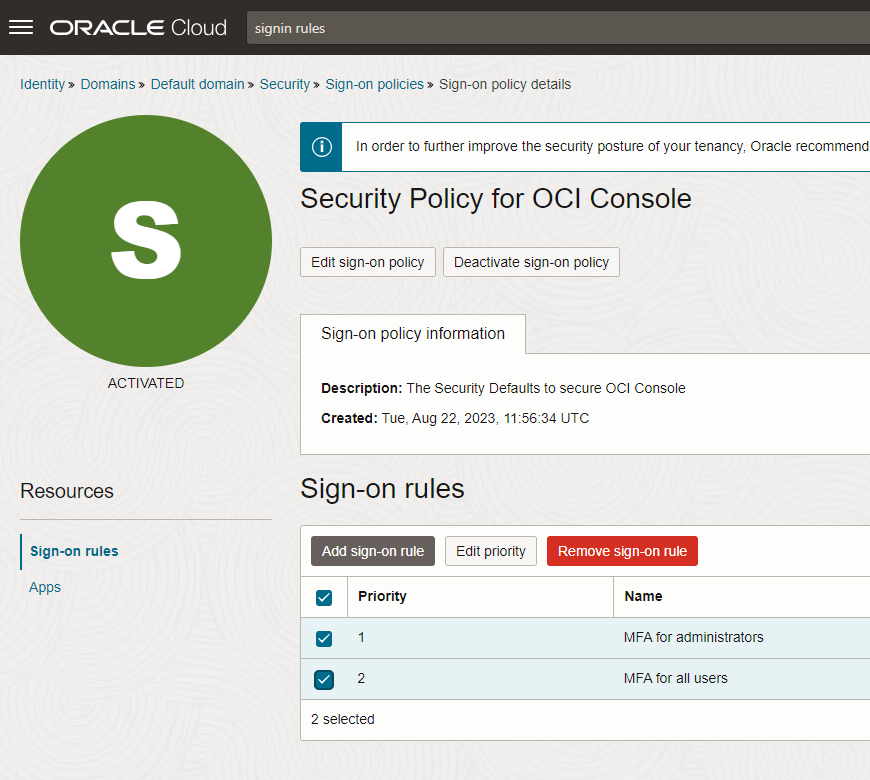
Please note that it is not advisable to disable security policies and multi-factor authentication (MFA) for cloud access. follow https://docs.oracle.com/en-us/iaas/Content/Security/Reference/iam_security_topic-IAM_MFA.htm for more information.

Reference
Posted in MFA, OCI, oracle, Security | Tagged: MFA, OCI, Oracle Cloud, Security | Leave a Comment »
Posted by Sriram Sanka on August 31, 2023
Unleash your potential by certifying on Oracle Cloud Infrastructure, free until September 30, 2023:
For more details, visit Free Certification for OCI.
Posted in Uncategorized | Leave a Comment »
Posted by Sriram Sanka on April 25, 2023
In this post, I will present the code to download Youtube Individual/Channel Videos step-by-step.
You can download the Videos using pytube module by passing the video URL as an argument. Just Install pytube and run as below.
python -m pip install pytube

This will download the given video URL to your current Directory, what about if you want to store your local copy for your educational purpose when you are offline.? The following will download the all the videos from the given URL to your desired location in the PC.
import requests
import re
from bs4 import BeautifulSoup
from pytube.cli import on_progress
from pytube import YouTube
from pytube import Playlist
from pytube import Channel
def get_youtube(i):
try:
yt = YouTube(i,on_progress_callback=on_progress)
yt.streams.filter(progressive=True, file_extension='mp4').order_by('resolution').desc().first().download('C:\\Users\\Dell\\Videos\\downs\\Sriram_Channel\\')
except:
print(f'\nError in downloading: {yt.title} from -->' + i)
pass
l = Channel('https://www.youtube.com/channel/UCw43xCtkl26vGIGtzBoaWEw')
for video in l.video_urls:
get_youtube(video)
You may get regular Expression error in fetching the video information due to changes implemented in the channel URL using symbols. or any other restrictions which are unsupported by the pytube module, either you have to download and install the latest or identify and fix it on your own.
To avoid this, you can use another module called scrapetube
pip install scrapetube

The following code will give you the Video id from the URL provided as input. you need to append ‘https://www.youtube.com/watch?v=’ to mark that as a complete URL.
import scrapetube
videos = scrapetube.get_channel("........t7XvGJ3AGpSon.......")
for video in videos:
print('https://www.youtube.com/watch?v='+ video['videoId'])

as you can see channel id is the key here, what if you are unaware of channel id.? You can get the channel id either from browser view page source or you can also use “requests” and “BeautifulSoup” module to get the channel ID


import requests
from bs4 import BeautifulSoup
url = input("Please Enter youtube channel URL ")
response = requests.get(url)
soup = BeautifulSoup(response.content,'html.parser')
print(soup.find("meta", itemprop="channelId")['content'])

Instead of using Channel from pytube module, to make it easier lets make changes to the original code snippet posted above, using module “scrapetube.get_channel “
import requests
import re
from bs4 import BeautifulSoup
from pytube.cli import on_progress
from pytube import YouTube
from pytube import Playlist
from pytube import Channel
import scrapetube
import json
def get_youtube(i):
try:
print('Downloading ' +i)
yt = YouTube(i,on_progress_callback=on_progress)
#print(f'\nStarted downloading: {yt} from -->' + i)
yt.streams.filter(progressive=True, file_extension='mp4').order_by('resolution').desc().first().download('C:\\Users\\Dell\\Videos\\downs\\Sriram_Channel\\')
except:
print('Error Downloading' +i)
pass
l = scrapetube.get_channel("UCw43xCtkl26vGIGtzBoaWEw")
for video in l:
#print('Downloading https://www.youtube.com/watch?v='+ video['videoId'])
get_youtube('https://www.youtube.com/watch?v='+ video['videoId'])
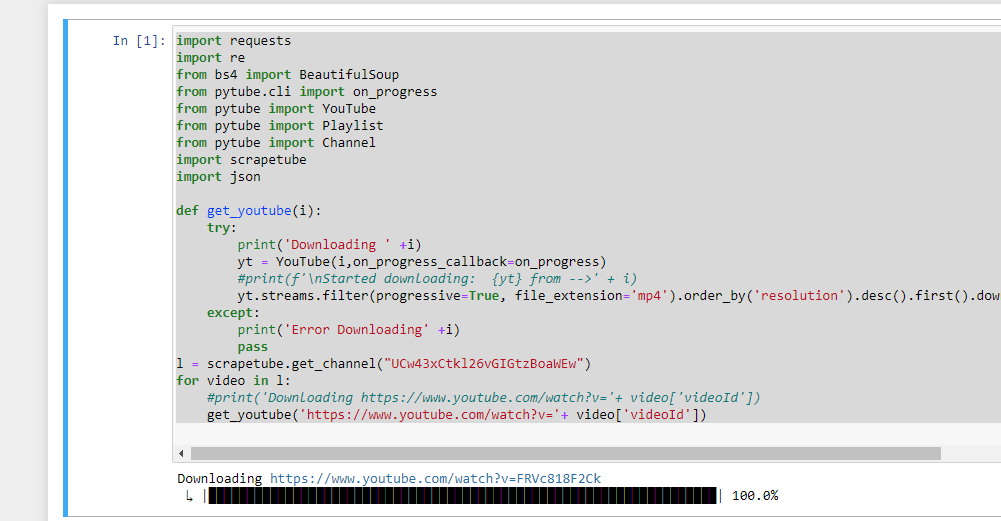
Hope you like it ! Happy Reading.
Posted in Python, pytube, scrapetube, WebScraping, youtube | Tagged: DOWNLOAD, Python, pytube, scrapetube, web-scraping, youtube, youtube channel | Leave a Comment »
Posted by Sriram Sanka on April 24, 2023
Chrome Browser Bookmark file is in JSON format whereas history file is a database format. One can read the data file using SQLite(DB Browser) to get the URL and downloads data.
In this post I am using chrome-bookmarks module to read the bookmarks and print the URL along with it Name and Folder Information.
Install chrome-bookmarks module using pip
pip install chrome-bookmarks

Now you can read the URL from Python as below.
import chrome_bookmarks
for url in chrome_bookmarks.urls:
print(url.url)

We Can also print the URL Description/Name as below.
import chrome_bookmarks
for url in chrome_bookmarks.urls:
print(url.url, url.name)

import chrome_bookmarks
for folder in chrome_bookmarks.folders:
print(folder.name)
print(folder.folders)

It is also possible to read the JSON without using the above module.
import json
file ="C:\\Users\\Dell\\AppData\\Local\\Google\\Chrome\\User Data\\Default\\Bookmarks"
with open(file, "r", encoding='utf-8') as bookmarks:
bookmark_data = json.load(bookmarks)
print(json.dumps(bookmark_data, indent=1))
{
"checksum": "7b7d115080ddda0dcab6b428f64aa3a5",
"roots": {
"bookmark_bar": {
"children": [
{
"date_added": "13326789370504643",
"date_last_used": "0",
"guid": "5c3e2329-1d0c-4a9d-b85e-426d6fd31301",
"id": "62",
"meta_info": {
"power_bookmark_meta": ""
},
"name": "Oracle | Cloud Applications and Cloud Platform",
"type": "url",
"url": "https://www.oracle.com/"
},
{
"date_added": "13326789428536219",
"date_last_used": "0",
"guid": "0a972887-7f34-41b3-bf59-1f2f2f521a0e",
"id": "63",
"meta_info": {
"power_bookmark_meta": ""
},
"name": "Oracle Database Features",
"type": "url",
"url": "https://apex.oracle.com/database-features/"
},
{
"date_added": "13326789439984046",
"date_last_used": "0",
"guid": "25e1d231-a825-46fd-a8a9-829bf07dc5bf",
"id": "64",
"meta_info": {
"power_bookmark_meta": ""
},
"name": "Cloud Sign In",
"type": "url",
"url": "https://www.oracle.com/cloud/sign-in.html?redirect_uri=https%3A%2F%2Fcloud.oracle.com%2F"
},
{
"date_added": "13326789456087992",
"date_last_used": "0",
"guid": "a0e39859-9596-47be-bc61-d6099f152fb1",
"id": "65",
"meta_info": {
"power_bookmark_meta": ""
},
"name": "Oracle Blogs",
"type": "url",
"url": "https://blogs.oracle.com/"
},
{
"children": [
{
"date_added": "13326789491584887",
"date_last_used": "0",
"guid": "b6f90dec-e303-4a2b-bb53-a7357c8d694f",
"id": "67",
"meta_info": {
"power_bookmark_meta": ""
},
"name": "Oracle | Cloud Applications and Cloud Platform",
"type": "url",
"url": "https://www.oracle.com/"
},
{
"date_added": "13326789491585797",
"date_last_used": "0",
"guid": "ffeea96a-87d7-4053-b674-7ac9cfb50a13",
"id": "68",
"meta_info": {
"power_bookmark_meta": ""
},
"name": "Oracle Database Features",
"type": "url",
"url": "https://apex.oracle.com/database-features/"
},
{
"children": [
{
"date_added": "13326789491586570",
"date_last_used": "0",
"guid": "851ce296-3918-47ab-981a-21fcab632edc",
"id": "70",
"meta_info": {
"power_bookmark_meta": ""
},
"name": "Oracle Blogs",
"type": "url",
"url": "https://blogs.oracle.com/"
},
{
"date_added": "13326789491586243",
"date_last_used": "0",
"guid": "5b21937d-66d9-4eea-9491-7d7c2e22152b",
"id": "69",
"meta_info": {
"power_bookmark_meta": ""
},
"name": "Cloud Sign In",
"type": "url",
"url": "https://www.oracle.com/cloud/sign-in.html?redirect_uri=https%3A%2F%2Fcloud.oracle.com%2F"
}
],
"date_added": "13326789519632624",
"date_last_used": "0",
"date_modified": "13326789527363048",
"guid": "9b0bbece-a9fd-4678-a846-896b7a2a54ec",
"id": "71",
"name": "Oracle_Child",
"type": "folder"
}
],
"date_added": "13326789485096843",
"date_last_used": "0",
"date_modified": "13326789519632800",
"guid": "ea6663fa-05df-4751-b25b-125561aed88d",
"id": "66",
"name": "Oracle",
"type": "folder"
}
],
"date_added": "13326774450786953",
"date_last_used": "0",
"date_modified": "13326789491586570",
"guid": "0bc5d13f-2cba-5d74-951f-3f233fe6c908",
"id": "1",
"name": "Bookmarks bar",
"type": "folder"
},
"other": {
"children": [],
"date_added": "13326774450786955",
"date_last_used": "0",
"date_modified": "0",
"guid": "82b081ec-3dd3-529c-8475-ab6c344590dd",
"id": "2",
"name": "Other bookmarks",
"type": "folder"
},
"synced": {
"children": [],
"date_added": "13326774450786957",
"date_last_used": "0",
"date_modified": "0",
"guid": "4cf2e351-0e85-532b-bb37-df045d8f8d0f",
"id": "3",
"name": "Mobile bookmarks",
"type": "folder"
}
},
"version": 1
}
Hope you like it. ! Happy learning.
Posted in Python | Tagged: Python | Leave a Comment »
Posted by Sriram Sanka on April 5, 2023
Azure ARM Template Validation Tool Kit helps you to validate & meet the Requirements to Publish your Solution to Azure Market Place.
You can Download the Latest Toolkit from https://github.com/Azure/arm-ttk/releases .
Get-ChildItem *.ps1, *.psd1, *.ps1xml, *.psm1 -Recurse | Unblock-File
Import-Module .\arm-ttk.psd1
Test-AzTemplate -TemplatePath \path\to\template
Download and Extract(unzip) arm-ttk.zip file

Start the Power Shell as administrator & Navigate to the Extracted Folder/Directory.
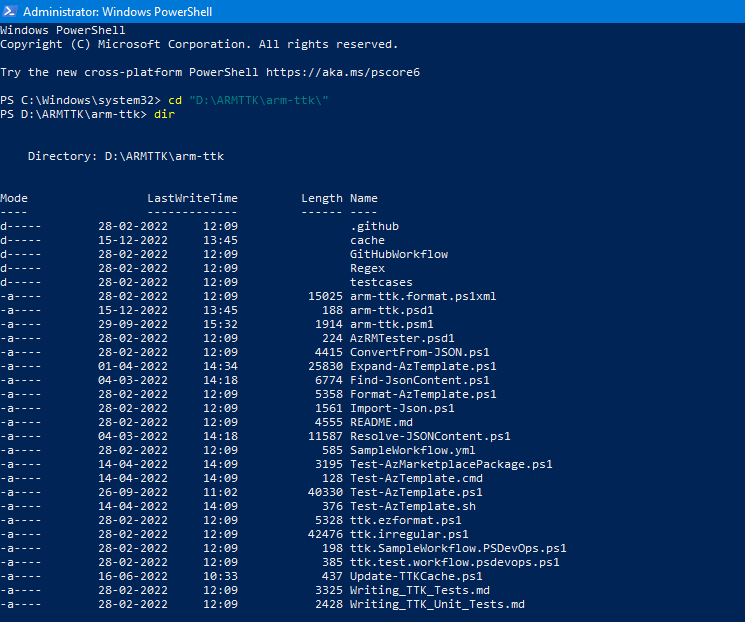
Unblock the script files Using “Get-ChildItem *.ps1, *.psd1, *.ps1xml, *.psm1 -Recurse | Unblock-File”

Import the module using ” Import-Module .\arm-ttk.psd1 “

As mentioned in the Error, we need to Enable Execution Policy as Remote Signed to Local Machine to avoid the above Error.
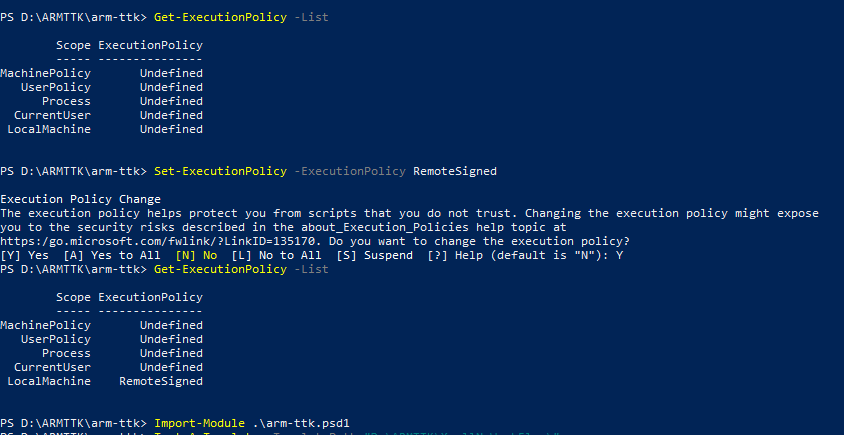
Note : If you do not wish to Import the Module, You can still run the Test-AzTemplate as Local using “./Test-AzTemplate ” check the help provided for more Details.
Run “Test-AzTemplate -TemplatePath \path\to\template” to validate your ARM Templates (In My Case UI Definition and MainTemplate)

Fix the Reported issues and revalidate.
PS D:\ARMTTK\arm-ttk> Test-AzTemplate -TemplatePath "D:\ARMTTK\XcellNoWorkFlow\" Validating XcellNoWorkFlow\createUiDefinition.json JSONFiles Should Be Valid [+] JSONFiles Should Be Valid (30 ms) Allowed Values Should Actually Be Allowed [+] Allowed Values Should Actually Be Allowed (100 ms) Controls In Outputs Must Exist [+] Controls In Outputs Must Exist (19 ms) CreateUIDefinition Must Not Have Blanks [+] CreateUIDefinition Must Not Have Blanks (21 ms) CreateUIDefinition Should Have Schema [+] CreateUIDefinition Should Have Schema (13 ms) Credential Confirmation Should Not Be Hidden [+] Credential Confirmation Should Not Be Hidden (93 ms) Handler Must Be Correct [+] Handler Must Be Correct (10 ms) HideExisting Must Be Correctly Handled [+] HideExisting Must Be Correctly Handled (154 ms) Location Should Be In Outputs [+] Location Should Be In Outputs (9 ms) Outputs Must Be Present In Template Parameters [+] Outputs Must Be Present In Template Parameters (10 ms) Parameters Without Default Must Exist In CreateUIDefinition [+] Parameters Without Default Must Exist In CreateUIDefinition (20 ms) Password Textboxes Must Be Used For Password Parameters [+] Password Textboxes Must Be Used For Password Parameters (65 ms) PasswordBoxes Must Have Min Length [+] PasswordBoxes Must Have Min Length (60 ms) Textboxes Are Well Formed [?] Textboxes Are Well Formed (66 ms) TextBox 'AppLoginEmail' regex does not have a length constraint. Tooltips Should Be Present [+] Tooltips Should Be Present (66 ms) Usernames Should Not Have A Default [+] Usernames Should Not Have A Default (61 ms) Validations Must Have Message [+] Validations Must Have Message (60 ms) VMSizes Must Match Template [+] VMSizes Must Match Template (62 ms) Validating XcellNoWorkFlow\mainTemplate.json adminUsername Should Not Be A Literal [+] adminUsername Should Not Be A Literal (59 ms) apiVersions Should Be Recent In Reference Functions [+] apiVersions Should Be Recent In Reference Functions (11 ms) apiVersions Should Be Recent [+] apiVersions Should Be Recent (117 ms)
artifacts parameter
[+] artifacts parameter (18 ms)
CommandToExecute Must Use ProtectedSettings For Secrets
[+] CommandToExecute Must Use ProtectedSettings For Secrets (68 ms)
DependsOn Best Practices
[+] DependsOn Best Practices (59 ms)
Deployment Resources Must Not Be Debug
[+] Deployment Resources Must Not Be Debug (56 ms)
DeploymentTemplate Must Not Contain Hardcoded Uri
[+] DeploymentTemplate Must Not Contain Hardcoded Uri (14 ms)
DeploymentTemplate Schema Is Correct
[+] DeploymentTemplate Schema Is Correct (9 ms)
Dynamic Variable References Should Not Use Concat
[+] Dynamic Variable References Should Not Use Concat (12 ms)
IDs Should Be Derived From ResourceIDs
[+] IDs Should Be Derived From ResourceIDs (67 ms)
Location Should Not Be Hardcoded
[+] Location Should Not Be Hardcoded (154 ms)
ManagedIdentityExtension must not be used
[+] ManagedIdentityExtension must not be used (10 ms)
Min And Max Value Are Numbers
[+] Min And Max Value Are Numbers (10 ms)
Outputs Must Not Contain Secrets
[+] Outputs Must Not Contain Secrets (12 ms)
Parameter Types Should Be Consistent
[+] Parameter Types Should Be Consistent (87 ms)
Parameters Must Be Referenced
[+] Parameters Must Be Referenced (52 ms)
Password params must be secure
[+] Password params must be secure (16 ms)
providers apiVersions Is Not Permitted
[+] providers apiVersions Is Not Permitted (18 ms)
ResourceIds should not contain
[+] ResourceIds should not contain (22 ms)
Resources Should Have Location
[+] Resources Should Have Location (11 ms)
Resources Should Not Be Ambiguous
[+] Resources Should Not Be Ambiguous (12 ms)
Secure Params In Nested Deployments
[+] Secure Params In Nested Deployments (56 ms)
Secure String Parameters Cannot Have Default
[+] Secure String Parameters Cannot Have Default (12 ms)
Template Should Not Contain Blanks
[+] Template Should Not Contain Blanks (164 ms)
URIs Should Be Properly Constructed
[+] URIs Should Be Properly Constructed (173 ms)
Variables Must Be Referenced
[+] Variables Must Be Referenced (11 ms)
Virtual Machines Should Not Be Preview
[+] Virtual Machines Should Not Be Preview (64 ms)
VM Images Should Use Latest Version
[+] VM Images Should Use Latest Version (9 ms)
VM Size Should Be A Parameter
[+] VM Size Should Be A Parameter (82 ms)
Pass : 48
Fail : 0
Total : 48
Restrict the Execution Policy to its previous state.

Hope you find it useful, Happy Learning.
Posted in ARM Template, ARM-TTK, Azure, Cloud, Installation, Microsoft Azure Cloud ARM Template | Tagged: ARM, Azure, Cloud, Installaiton, powershell, TEMPLATE, TTK | Leave a Comment »
Its all about Databases, their performance, troubleshooting & much more .... ¯\_(ツ)_/¯
Michael T. Dinh, Oracle DBA
by Mehmet Eser
Performance troubleshooting as exact science
get sum oracle stuffs
Dani Schnider's Blog
Oracle DBA's Daily Work
Welcome everyone!! The idea of this blog is to help the DBA in their daily tasks. Enjoy.
Learn. Share. Repeat.
Oracle Performance Tuning, Troubleshooting, Internals
Journey as an Oracle Certified Master
A resource for Database Professionals
Tips, tricks, (and maybe a few rants) so more DBA's become bulletproof!
Consulting and Training